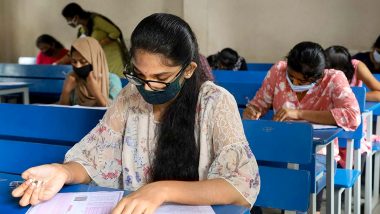Washington, January 16: A University of Saskatchewan study has found that the COVID-19 pandemic has led to significant worsening of already poor dietary habits, low activity levels, sedentary behaviour, and high alcohol consumption among university students.
The findings of the study--the first to assess changes in students' dietary intake, physical activity, and sedentary behaviour before and during the pandemic--are published today in the journal Applied Physiology, Nutrition and Metabolism. COVID-19 in IIT Madras: 183 Students Test Positive for Coronavirus in Just 15 Days.
"Our findings are important because university students, especially those most vulnerable for poor nutrition and sedentary behaviour, should be targeted for interventions aimed at maintaining and improving physical activity and dietary practices during this pandemic and beyond," said lead author and nutrition professor Gordon Zello.
The four-month study involved 125 graduate and undergraduate students at USask and the University of Regina who were the most vulnerable as they were living independently or had roommates or partners, and were responsible for buying and preparing their own meals.
The students responded to an online questionnaire about their food and drink consumption, physical activity and sedentary behaviour before and during the pandemic.
The study began just as Saskatchewan was imposing pandemic restrictions, so details of what students were eating prior to the pandemic and during it were fresh on the minds of students, said Zello.
"With pre-pandemic research already showing university students to be a vulnerable group for inadequate diet and physical activity, the measures imposed to curb the COVID pandemic presented a unique opportunity to examine further impact on their lives," Zello said.
The study found that the students consumed less food every day during the pandemic compared to before. For instance, they ate 20 per cent less meat, 44 per cent less dairy, and 45 per cent fewer vegetables. While they also drank considerably fewer beverages such as coffee and tea, their alcohol consumption increased significantly, said Zello.
"This dietary inadequacy combined with long hours of sedentary behaviour and decreased physical activity could increase health risks in this unique population during COVID-19 confinement and once the pandemic ends," Zello said.
Several reasons could explain the dietary shift, said Zello and co-investigators kinesiology professor Phil Chilibeck and post-doctoral fellow Leandy Bernard.
Psychological distress has been linked to poor diet quality, particularly increased consumption of alcohol. As well, students could be eating less to offset their lack of exercise and increased sedentariness.
Zello said measures implemented to fight COVID spread, such as reduced store and restaurant hours, may have limited students' shopping frequency and at-home availability of food.
While only 16 per cent of participants were meeting Canadian guidelines of 150 minutes of moderate to intense physical activity per week before the pandemic, that further decreased to 9.6 per cent during the pandemic.
Of those who were meeting Canadian activity guidelines before the pandemic, 90 per cent became less active. Meanwhile, the number of hours spent in sedentary behaviour rose by three hours, to about 11 hours a day.
"There's no doubt that measures such as the closures of gyms and other recreational facilities by the universities and other private and public establishments within the province resulted in reductions in the level of physical activity," the study states.
Another reason for the reduction in physical activity may be that many students were no longer walking to school after the universities moved to remote learning, it says. About 55 per cent were employed before the pandemic, dropping to 49 per cent during the pandemic.
(This is an unedited and auto-generated story from Syndicated News feed, LatestLY Staff may not have modified or edited the content body)













 Quickly
Quickly




















